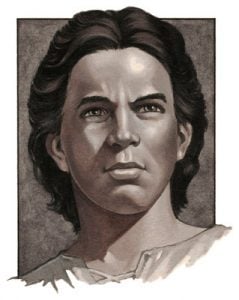Monday: The Entrance of Elihu
From Job chapters 26 to 31, the tragic hero of this story, Job, gives his final speech to the three men. Though eloquent and passionate, he basically repeats the argument he has been making all along: I do not deserve what has been happening to me. Period.
Again, Job represents so much of humanity in that many people suffer things that they don’t deserve. And the question, in many ways the hardest question of all, is—why? In some cases, the answer to suffering is relatively easy. People clearly bring the trouble on themselves. But so often, and especially in the case of Job, that’s not what happened, and so the question of suffering remains.
As chapter 31 comes to a close, Job has been talking about the kind of life he led, a life in which nothing he had done justified what was happening to him now. Then the final verse of the chapter reads: “The words of Job are ended” (Job 31:40).
Read Job 32:1–5. What is happening here, and what is Elihu’s charge against Job and the other men?
Here is the first time that this man, Elihu, is mentioned in the book of Job. He obviously heard some of the long discussions, though we are not told just when he appeared on the scene. He must have come later, because he was not mentioned as being with the other three when they first came. What we do know, however, is that he wasn’t satisfied with the answers he had heard during whatever part of the dialogue he heard. In fact, we’re told four times in these five verses that his “wrath” had been kindled over what he had heard. For the next six chapters, then, this man Elihu seeks to give his understanding and explanation of the issues that all these men confronted because of the calamity that struck Job.
| Job 32:2 said that Elihu was angry with Job because he “justified himself rather than God,” a distortion of Job’s true position. What should this tell us about how we need to be careful in the ways that we interpret the words of others? How can we learn to try to put the best construction rather than the worst on what people say? |


These men’s words to Job tells us how we human were destroyed by sin. Even the best of our friends are somehow unsympathetic with the suffering we face. But it was not so with Jesus; He is always at feeling with our suffering even though we are sinful.
While men look on the out side appearance, God looks on the heart.We need to be careful about what we think of others. What appear wrong to us may not apply to the circumstances. Even when we see and hear of a person’s situation, I say judge not, pray, love and be patient. Let us humble ourselves, God knows what He’s doing, even when we don’t understand. Cast no stones, let the holy spirit do its work. In all things let us give thanks, pray without ceasing. God loves us equally.
We should be careful in how we interpret words of others because we do not know what prompted them to say what they say, we do not know their emotional status when they say what they say and pain is also another factor.
Lets understand that we have different levels of understanding depending on education/experience/exposure and different level of faith/ spiritualism therefore we should not rush to interpret what is spoken without knowing this aspects of which you need guidance of the Holy Spirit in order to understand
In the scriptures insipiration has provided us with words of comfort that we should use to comfort one another. Let us prayerfully learn these words and use them as a healing balm. In the face of pain and sorrow, words of comfort can never misrepresent the facts.
This man was not supposed to answer because he had not heard the conversation from the beginning. He choose to comment and unfortunately he gave a negative comment…..
We also often just jump into the conversation of others which also bring complications. Suppose a family is having some issues but you have already jumped in. This in not good. The character he shows here is that he took himself to be holy enough to stand for God.
It is easy to put a blame on others because of our experiences, we assume and conclude in making judgements, when we feel that we know and understand.